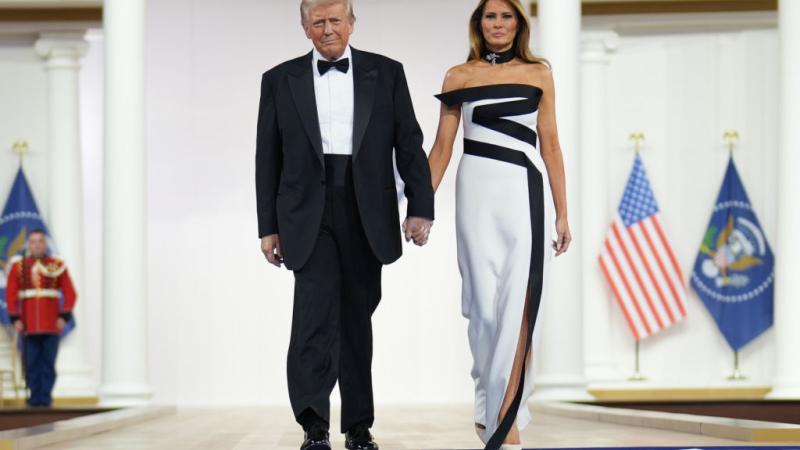Full text of National Archives letter to Trump on classified documents
Just the News has obtained the full text of the letter that the National Archives sent to former President Donald Trump requesting classified documents
Just the News has obtained the full text of the letter that the National Archives sent to former President Donald Trump requesting classified documents.
May 10, 2022
Evan Corcoran Silverman Thompson 400 East Pratt Street Suite 900
Baltimore, MD 21202 By Email
Dear Mr. Corcoran:
I write in response to your letters of April 29, 2022, and May 1, 2022, requesting that the National Archives and Records Administration (NARA) further delay the disclosure to the Federal Bureau of Investigation (FBI) of the records that were the subject of our April 12, 2022 notification to an authorized representative of former President Trump.
As you are no doubt aware, NARA had ongoing communications with the former President’s representatives throughout 2021 about what appeared to be missing Presidential records, which resulted in the transfer of 15 boxes of records to NARA in January 2022. In its initial review of materials within those boxes, NARA identified items marked as classified national security information, up to the level of Top Secret and including Sensitive Compartmented Information and Special Access Program materials. NARA informed the Department of Justice about that discovery, which prompted the Department to ask the President to request that NARA provide the FBI with access to the boxes at issue so that the FBI and others in the Intelligence Community could examine them. On April 11, 2022, the White House Counsel’s Office—affirming a request from the Department of Justice supported by an FBI letterhead memorandum—formally transmitted a request that NARA provide the FBI access to the 15 boxes for its review within seven days, with the possibility that the FBI might request copies of specific documents following its review of the boxes.
Although the Presidential Records Act (PRA) generally restricts access to Presidential records in NARA’s custody for several years after the conclusion of a President’s tenure in office, the statute further provides that, “subject to any rights, defenses, or privileges which the United States or any agency or person may invoke,” such records “shall be made available . . . to an incumbent President if such records contain information that is needed for the conduct of current business of the incumbent President’s office and that is not otherwise available.” 44 U.S.C. §
2205(2)(B). Those conditions are satisfied here. As the Department of Justice’s National Security Division explained to you on April 29, 2022:
There are important national security interests in the FBI and others in the Intelligence Community getting access to these materials. According to NARA, among the materials in the boxes are over 100 documents with classification markings, comprising more than 700 pages. Some include the highest levels of classification, including Special Access Program (SAP) materials. Access to the materials is not only necessary for purposes of our ongoing criminal investigation, but the Executive Branch must also conduct an assessment of the potential damage resulting from the apparent manner in which these materials were stored and transported and take any necessary remedial steps. Accordingly, we are seeking immediate access to these materials so as to facilitate the necessary assessments that need to be conducted within the Executive Branch.
We advised you in writing on April 12 that, “in light of the urgency of this request,” we planned to “provid[e] access to the FBI next week,” i.e., the week of April 18. See Exec. Order No. 13,489, § 2(b), 74 Fed. Reg. 4,669 (Jan. 21, 2009) (providing a 30-day default before disclosure but authorizing the Archivist to specify “a shorter period of time” if “required under the circumstances”); accord 36 C.F.R. § 1270.44(g) (“The Archivist may adjust any time period or deadline under this subpart, as appropriate, to accommodate records requested under this section.”). In response to a request from another representative of the former President, the White House Counsel’s Office acquiesced in an extension of the production date to April 29, and so advised NARA. In accord with that agreement, we had not yet provided the FBI with access to the records when we received your letter on April 29, and we have continued to refrain from providing such access to date.
It has now been four weeks since we first informed you of our intent to provide the FBI access to the boxes so that it and others in the Intelligence Community can conduct their reviews. Notwithstanding the urgency conveyed by the Department of Justice and the reasonable extension afforded to the former President, your April 29 letter asks for additional time for you to review the materials in the boxes “in order to ascertain whether any specific document is subject to privilege,” and then to consult with the former President “so that he may personally make any decision to assert a claim of constitutionally based privilege.” Your April 29 letter further states that in the event we do not afford you further time to review the records before NARA discloses them in response to the request, we should consider your letter to be “a protective assertion of executive privilege made by counsel for the former President.”
The Counsel to the President has informed me that, in light of the particular circumstances presented here, President Biden defers to my determination, in consultation with the Assistant Attorney General for the Office of Legal Counsel, regarding whether or not I should uphold the former President’s purported “protective assertion of executive privilege.” See 36 C.F.R. § 1270.44(f)(3). Accordingly, I have consulted with the Assistant Attorney General for the Office of Legal Counsel to inform my “determination as to whether to honor the former President’s claim of privilege or instead to disclose the Presidential records notwithstanding the claim of privilege.” Exec. Order No. 13,489, § 4(a).
The Assistant Attorney General has advised me that there is no precedent for an assertion of executive privilege by a former President against an incumbent President to prevent the latter from obtaining from NARA Presidential records belonging to the Federal Government where “such records contain information that is needed for the conduct of current business of the incumbent President’s office and that is not otherwise available.” 44 U.S.C. § 2205(2)(B).
To the contrary, the Supreme Court’s decision in Nixon v. Administrator of General Services, 433 U.S. 425 (1977), strongly suggests that a former President may not successfully assert executive privilege “against the very Executive Branch in whose name the privilege is invoked.” Id. at 447-48. In Nixon v. GSA, the Court rejected former President Nixon’s argument that a statute requiring that Presidential records from his term in office be maintained in the custody of, and screened by, NARA’s predecessor agency—a “very limited intrusion by personnel in the Executive Branch sensitive to executive concerns”—would “impermissibly interfere with candid communication of views by Presidential advisers.” Id. at 451; see also id. at 455 (rejecting the claim). The Court specifically noted that an “incumbent President should not be dependent on happenstance or the whim of a prior President when he seeks access to records of past decisions that define or channel current governmental obligations.” Id. at 452; see also id. at 441-46 (emphasizing, in the course of rejecting a separation-of-powers challenge to a provision of a federal statute governing the disposition of former President Nixon’s tape recordings, papers, and other historical materials “within the Executive Branch,” where the “employees of that branch [would] have access to the materials only ‘for lawful Government use,’” that “[t]he Executive Branch remains in full control of the Presidential materials, and the Act facially is designed to ensure that the materials can be released only when release is not barred by some applicable privilege inherent in that branch”; and concluding that “nothing contained in the Act renders it unduly disruptive of the Executive Branch”).
It is not necessary that I decide whether there might be any circumstances in which a former President could successfully assert a claim of executive privilege to prevent an Executive Branch agency from having access to Presidential records for the performance of valid executive functions. The question in this case is not a close one. The Executive Branch here is seeking access to records belonging to, and in the custody of, the Federal Government itself, not only in order to investigate whether those records were handled in an unlawful manner but also, as the National Security Division explained, to “conduct an assessment of the potential damage resulting from the apparent manner in which these materials were stored and transported and take any necessary remedial steps.” These reviews will be conducted by current government personnel who, like the archival officials in Nixon v. GSA, are “sensitive to executive concerns.” Id. at 451. And on the other side of the balance, there is no reason to believe such reviews could “adversely affect the ability of future Presidents to obtain the candid advice necessary for effective decisionmaking.” Id. at 450. To the contrary: Ensuring that classified information is appropriately protected, and taking any necessary remedial action if it was not, are steps essential to preserving the ability of future Presidents to “receive the full and frank submissions of facts and opinions upon which effective discharge of [their] duties depends.” Id. at 449.
Because an assertion of executive privilege against the incumbent President under these circumstances would not be viable, it follows that there is no basis for the former President to make a “protective assertion of executive privilege,” which the Assistant Attorney General informs me has never been made outside the context of a congressional demand for information from the Executive Branch. Even assuming for the sake of argument that a former President may under some circumstances make such a “protective assertion of executive privilege” to preclude the Archivist from complying with a disclosure otherwise prescribed by 44 U.S.C. § 2205(2), there is no predicate for such a “protective” assertion here, where there is no realistic basis that the requested delay would result in a viable assertion of executive privilege against the incumbent President that would prevent disclosure of records for the purposes of the reviews described above. Accordingly, the only end that would be served by upholding the “protective” assertion here would be to delay those very important reviews.
I have therefore decided not to honor the former President’s “protective” claim of privilege. See Exec. Order No. 13,489, § 4(a); see also 36 C.F.R. 1270.44(f)(3) (providing that unless the incumbent President “uphold[s]” the claim asserted by the former President, “the Archivist discloses the Presidential record”). For the same reasons, I have concluded that there is no reason to grant your request for a further delay before the FBI and others in the Intelligence Community begin their reviews. Accordingly, NARA will provide the FBI access to the records in question , as requested by the incumbent President, beginning as early as Thursday, May 12, 2022.
Please note that, in accordance with the PRA, 44 U.S.C. § 2205(3), the former President’s designated representatives can review the records, subject to obtaining the appropriate level of security clearance. Please contact my General Counsel, Gary M. Stern, if you would like to discuss the details of such a review, such as you proposed in your letter of May 5, 2022, particularly with respect to any unclassified materials.
Sincerely,
DEBRA STEIDEL WALL
Acting Archivist of the United States















